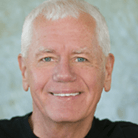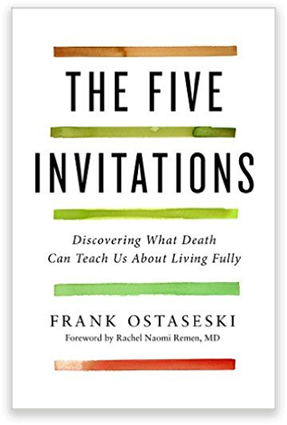Life and death are a package deal. You cannot pull them apart.
In Japanese Zen, the term shoji translates as “birth-death.” There is no separation between life and death other than a small hyphen, a thin line that connects the two.
We cannot be truly alive without maintaining an awareness of death. Death is not waiting for us at the end of a long road. Death is always with us, in the marrow of every passing moment. She is the secret teacher hiding in plain sight. She helps us to discover what matters most. And the good news is we don’t have to wait until the end of our lives to realize the wisdom that death has to offer.
Over the past thirty years, I have sat on the precipice of death with a few thousand people. Some came to their deaths full of disappointment. Others blossomed and stepped through that door full of wonder. What made the difference was the willingness to gradually live into the deeper dimensions of what it means to be human.
Below are five mutually supportive principles, permeated with love, that have served me as reliable guides for coping with death.
1. Don’t Wait
When people are dying, it is easy for them to recognize that every minute, every breath counts. But the truth is, death is always with us, integral to life itself. Everything is constantly changing. Nothing is permanent. This idea can both frighten and inspire us. Yet if we listen closely, the message we hear is: Don’t wait.
“The problem with the word patience,” said Zen master Suzuki Roshi, “is that it implies we are waiting for something to get better, we are waiting for something good that will come. A more accurate word for this quality is constancy, a capacity to be with what is true moment after moment.”
Embracing the truth that all things inevitably must end encourages us not to wait in order to begin living each moment in a manner that is deeply engaged. We stop wasting our lives on meaningless activities. We learn to not hold our opinions, our desires, and even our own identities so tightly. Instead of pinning our hopes on a better future, we focus on the present and being grateful for what we have in front of us right now. We say “I love you” more often because we realize the importance of human connection. We become kinder, more compassionate, and more forgiving.
Don’t wait is a pathway to fulfillment and an antidote to regret.
2. Welcome Everything, Push Away Nothing
In welcoming everything, we don’t have to like what is arising. It’s actually not our job to approve or disapprove. The word welcome confronts us; it asks us to temporarily suspend our usual rush to judgment and to simply be open to what is happening. Our task is to give our careful attention to what is showing up at our front door. To receive it in the spirit of hospitality.
We like the familiar; we like certainty. We love to have our preferences met. In fact, most of us have been taught that getting what we want and avoiding what we don’t is the way to assure our happiness. Inevitably, though, there are unexpected experiences in our lives—an unanticipated move, a job loss, a family member’s illness, the death of a beloved pet—that we want to push away with all our might. When faced with the uncertain, our first reaction is often resistance. We attempt to evict these di cult parts of our lives as if they were unwanted houseguests. In such moments, welcoming seems impossible or even unwise. When I say that we should be receptive to whatever presents itself to us, do I mean that we should let life walk all over us?
Not at all.
When we are open and receptive, we have options. We are free to discover, to investigate, and to learn how to respond skillfully to anything we encounter. We can’t be free if we are rejecting any part of our lives. With welcoming comes an ability to meet and work with both pleasant and unpleasant circumstances. Gradually, with practice, we discover that our well-being is not solely dependent on what’s happening in our external reality; it comes from within.
In order to experience true freedom, we need to be able to welcome everything just as it is. At the deepest level, this invitation, like life itself, asks us to cultivate a kind of fearless receptivity. Welcome everything, push away nothing cannot be done solely as an act of will. To welcome everything is an act of love.
3. Bring Your Whole Self to the Experience
We all like to look good. We long to be seen as capable, strong, intelligent, sensitive, spiritual, or at least well adjusted. We project a positive self-image. Few of us want to be known for our helplessness, fear, anger, or ignorance, or want others to know that sometimes we are more of a mess than we’d like to admit.
Yet more than once I have found an “undesirable” aspect of myself, one about which I previously had felt ashamed and kept tucked away, to be the very quality that allowed me to meet another person’s suffering with compassion instead of fear or pity. My own experience of abuse allowed me to empathize with both the abused and the abuser, to help each find forgiveness for their anger and open toward their fear. It is not our expertise, but rather the wisdom gained from our own suffering, vulnerability, and healing that enables us to be of real assistance to others. It is the exploration of our inner lives that facilitates us in forming an empathetic bridge from our experience to theirs.
To be whole, we need to include, accept, and connect all parts of ourselves. We need acceptance of our convicting qualities and the seeming incongruity of our inner and outer worlds.
Wholeness does not mean perfection. It means no part left out.
4. Find a Place of Rest in the Middle of Things
We often think of rest as something that will come to us when everything else in our lives is complete: at the end of the day, when we take a bath; once we go on holiday or get through all our to-do lists. We imagine that we can only find rest by changing our circumstances.
The fourth principal teaches us that we can find a place of rest within us, without having to alter the conditions of our lives.
This place of rest is always available to us. We need only turn toward it. It is experienced when we bring our full attention, without distraction, to this moment, to this activity. With sincere practice, after some time, we can come to know this spaciousness as a regular part of our lives. It manifests as an aspect of us that is never sick, is not born, and does not die.
5. Cultivate ‘Don’t Know’ Mind
Zen koans are stories, dialogues, or phrases meant to help us deal with our very human problems. Koans often appear contradictory, but they are not intended as riddles or puzzles to be solved. Rather, they are meant to help us gain insight, freeing us up from our ordinary ways of seeing and knowing the world by propelling us toward our direct experience.
The koan “Cultivate don’t know mind” may seem confusing at first. Why should we seek to be ignorant? But this is not an encouragement to avoid knowledge. Don’t know mind is one characterized by curiosity, surprise, and wonder. It is receptive, ready to meet whatever shows up as it is.
As we go about our day-to-day lives, we rely on our knowledge. We have confidence in our ability to think through problems, to figure things out. We are educated; we have training in specific subjects that permits us to do our jobs well. We accumulate information through experience, learning as we go. All this is helpful and necessary in moving through our lives smoothly.
Ignorance is usually thought of as the absence of information, being unaware. Sadly, it is more than just “not knowing.” It means that we know something, but it is the wrong thing. Ignorance is misperception.
Don’t know mind represents something else entirely. It is beyond knowing and not knowing. It is off the charts of our conventional ideas about knowledge and ignorance. It is the “beginner’s mind” Zen master Suzuki Roshi spoke of when he famously said, “In the beginner’s mind there are many possibilities, but in the expert’s there are few.”
Don’t know mind is not limited by agendas, roles, and expectations. It is free to discover. When we are filled with knowing, when our minds are made up, it narrows our vision, obscures our ability to see the whole picture, and limits our capacity to act. We only see what our knowing allows us to see. The wise person is both compassionate and humble and knows that she does not know.
Don’t know mind is an invitation to enter life with fresh eyes, to empty our minds and open our hearts.
***
These five principles have served me as reliable guides for coping with death. And, as it turns out, they are equally relevant guides to living a life of integrity. They can be applied just as aptly to people dealing with all sorts of transitions and crises—from a move to a new city, to the forming or releasing of an intimate relationship, to getting used to living without your children at home. 




Leave a Comment